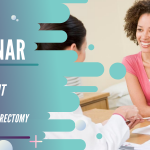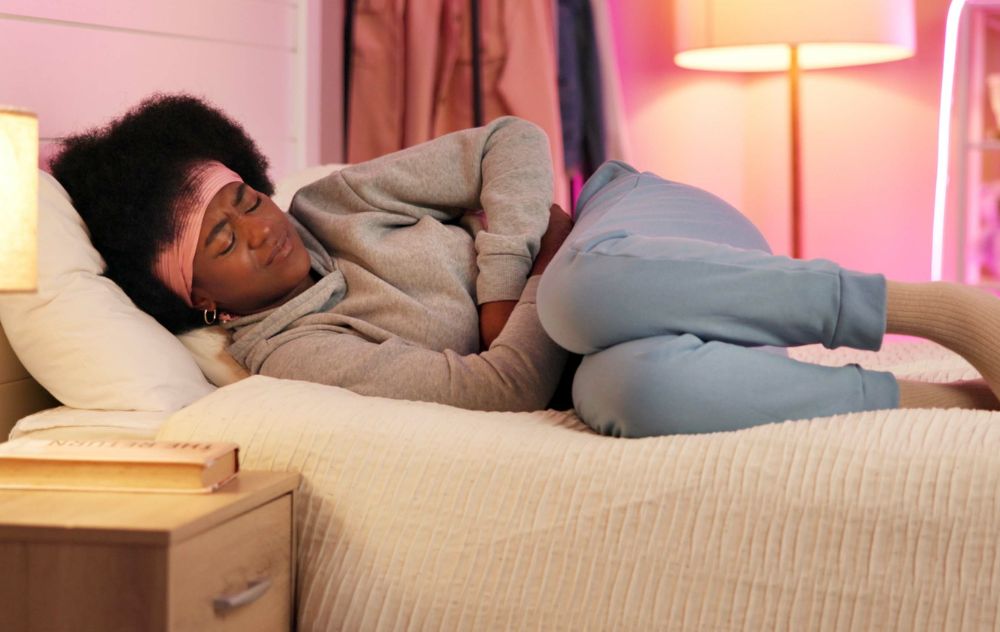
If your periods have become unpredictable, heavier, or even absent, uterine fibroids could be the underlying cause. Over half of women between the ages of 18 and 50 develop these noncancerous growths, and one of the earliest signs is an abnormal menstrual cycle.
Fibroids can lead to menstrual irregularities, including altered cycle timing, extended duration, and increased flow, causing significant disruptions to daily routines. If you’ve noticed significant changes in your period or uncomfortable symptoms, consult USA Fibroid Centers today to find relief.
Regular vs. Abnormal Periods
Regular periods vary based on the individual but generally last between three to eight days, with cycles ranging from 21 to 35 days. Typical period symptoms include minimal spotting, manageable cramps with over-the-counter medications, and temporary bloating.
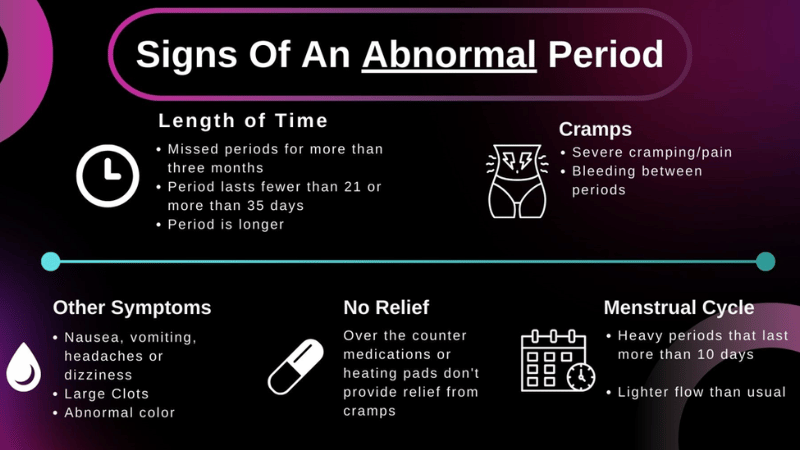
A cycle is considered abnormal if it:
- Lasts fewer than 21 or more than 35 days
- Skips three or more consecutive months
- Is significantly heavier or lighter than usual
- Lasts longer than seven days
- Causes severe pain/cramps, nausea, vomiting, or excessive clotting
- Abnormal color
- Bleeding between periods
Conditions like endometriosis, adenomyosis, and fibroids affect periods and can cause abnormal menstruation and related symptoms.
How Do Fibroids Affect Periods?
Fibroids are noncancerous growths that develop in or around the uterus. While they are generally benign, fibroids during your period can cause uncomfortable symptoms. Depending on their size, location, and number, these growths can alter the flow and even the length of your period.
Do Fibroids Cause Missed Periods?
A menstrual cycle with fibroids can disrupt hormone levels or obstruct normal uterine blood flow, leading to irregular cycles. As a result, some women experience missed periods one month, followed by heavy bleeding the next. If a period is missed for more than three consecutive months, it’s best to consult a healthcare provider to determine if you have an underlying condition like fibroids.
Do Fibroids Cause Late Periods?
There is a relationship between late periods and fibroids. Uterine fibroids cause irregularities in the uterine lining and trigger hormonal imbalances and fluctuations in estrogen and progesterone. They may disrupt the normal cycle of the endometrium, delaying its shedding and causing a period to start later than expected. Additionally, the hormonal changes associated with fibroids can further alter the timing of your cycle. Also, Perimenopause, the transitional period leading to menopause, brings hormonal fluctuations that can significantly impact women with fibroids, particularly concerning their periods.
Can Fibroids Stop Your Period?
While fibroids can cause significant irregularities, they are less likely to cause complete amenorrhea (the absence of menstruation) unless other factors, such as menopause, are involved.
It is more common that fibroids cause very irregular cycles. This irregular bleeding can lead to a feeling of one’s cycle being stopped, when in reality it is very disrupted.
How Uterine Fibroids Cause a Heavy Menstrual Cycle
One way fibroids affect periods is by causing heavy bleeding. Fibroids increase the surface area of the uterine lining and impair the uterine contractions that help control blood flow. These benign growths can distort the uterine cavity, affecting menstrual flow.
Some signs your heavy periods are a result of fibroids include:
- Bleeding that lasts longer than 7 days
- Spotting between cycles
- Frequent large blood clots
- Symptoms of anemia (fatigue, dizziness, shortness of breath)
If heavy bleeding is affecting your life, schedule a consultation for fibroid treatment options.
Other Symptoms Related to Fibroids and Menstruation
Uterine fibroids can cause a range of period symptoms beyond heavy bleeding. For instance, they can trigger early shedding of the uterine lining, which leads to shortened cycles with periods coming closer together than expected.
In addition, fibroids can exert pressure on the uterine walls, resulting in severe cramping and pelvic pain during menstruation. If you’re experiencing these issues, it may be time to consult a healthcare provider about treatment options.
CALL 855.615.2555 TO LEARN MORE
How Fibroids Disrupt Daily Life
Living with fibroids can take a toll on your daily life. The constant discomfort and heavy bleeding may leave you feeling drained, making it difficult to keep up with work, social events, or even simple daily tasks.
Many women feel self-conscious about a protruding abdomen caused by fibroids, leading them to change the way they dress or avoid certain activities altogether. Pain and fatigue can force you to cancel plans, call off work, or rely on over-the-counter pain medication just to get through the day.
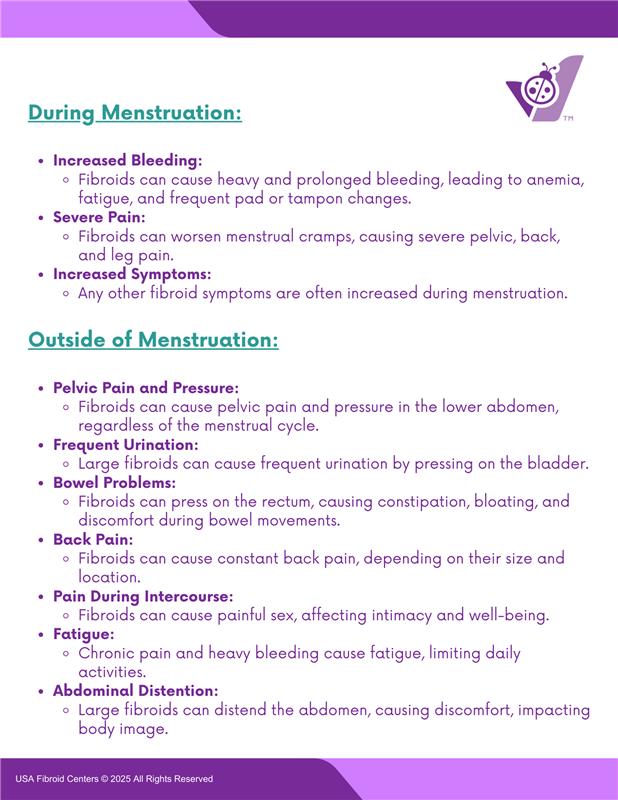
How to Monitor Your Menstrual Health
The best way to monitor your menstrual cycle with fibroids is to track your period symptoms and stay consistent with your doctor’s appointments. Using a symptom journal or period-tracking app to record your period’s flow, cycle length, clotting, and pain levels. Regular health screenings can help with early detection and preventive care.
If you experience any of the following, seek medical attention:
- Periods lasting longer than 7-10 days
- Missed or irregular cycles
- Extreme pain or excessive clotting
Understanding the relationship between fibroids and periods allows you to discuss potential treatments with a fibroid specialist to find relief from painful symptoms.
Treatment Options for Handling Fibroids During Menstruation
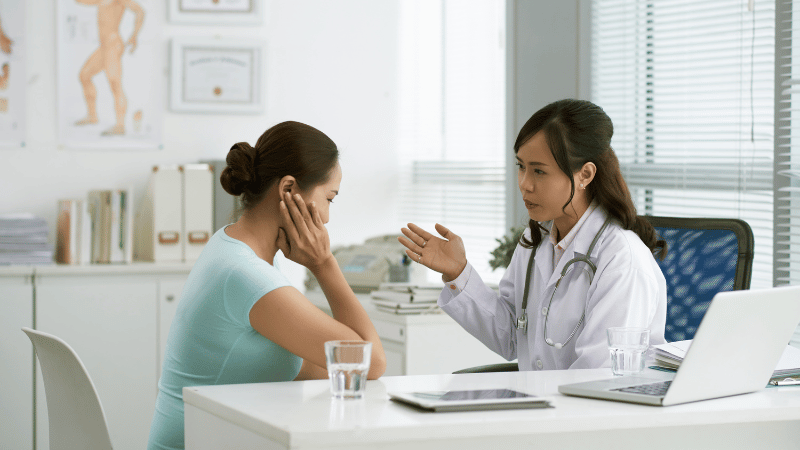
There are ways to manage fibroids during menstruation, such as keeping pain-relieving medicine on hand and using extra menstrual products. However, these temporary measures don’t address the root cause of abnormal period symptoms. Uterine fibroid embolization (UFE) targets fibroids, offering long-term relief from painful and uncomfortable menstrual symptoms.
Uterine Fibroid Embolization (UFE)
Uterine fibroid embolization (UFE) is a minimally invasive treatment that shrinks fibroids, reducing symptoms of an abnormal period, such as heavy bleeding. Our highly skilled interventional radiologists use imaging to locate the artery feeding the fibroid. A tiny catheter is inserted into the artery to inject embolic agents that block blood flow. When a fibroid is deprived of its blood supply and therefore nutrients, it can no longer grow, and will shrink and die.
UFE helps alleviate painful symptoms affecting your daily life and decreases discomfort during your menstrual cycle while preserving your uterus. Since UFE is a non-surgical procedure, recovery typically takes one to two weeks.
If you’re looking for treatment for uterine fibroids, schedule a consultation with USA Fibroid Centers to explore UFE treatment or call 855.615.2555.
Uterine Fibroids and Menstrual Cycle FAQs
Can Fibroids Cause Irregular Period Cycles Every Month?
Uterine fibroids can lead to unpredictable menstrual cycles, resulting in early, late, or skipped periods. Fibroids can disrupt the normal hormonal balance that regulates your cycle, interfering with the expected timing of your period. Additionally, fibroids may affect the uterine lining, which can cause spotting or bleeding between cycles. If you’re experiencing such irregularities in your cycle, it’s important to consult with a healthcare provider to determine the underlying cause and explore treatment options.
Why do Fibroids Cause Period Pain?
Fibroids contribute to painful periods by thickening the uterine lining, which leads to heavier bleeding and more intense uterine contractions. They also exert pressure on pelvic nerves and organs, causing severe cramping, discomfort, and sometimes blood clot formation.
Can Fibroids Affect Ovulation and Fertility?
Since fibroids affect periods, they can also impact fertility, especially submucosal fibroids that grow inside the uterine cavity and interfere with egg implantation. Many women with fibroids may not experience infertility issues, as the impact largely depends on the size, number, and location of the fibroids. Treatments like uterine fibroid embolization (UFE) can help preserve reproductive health.



